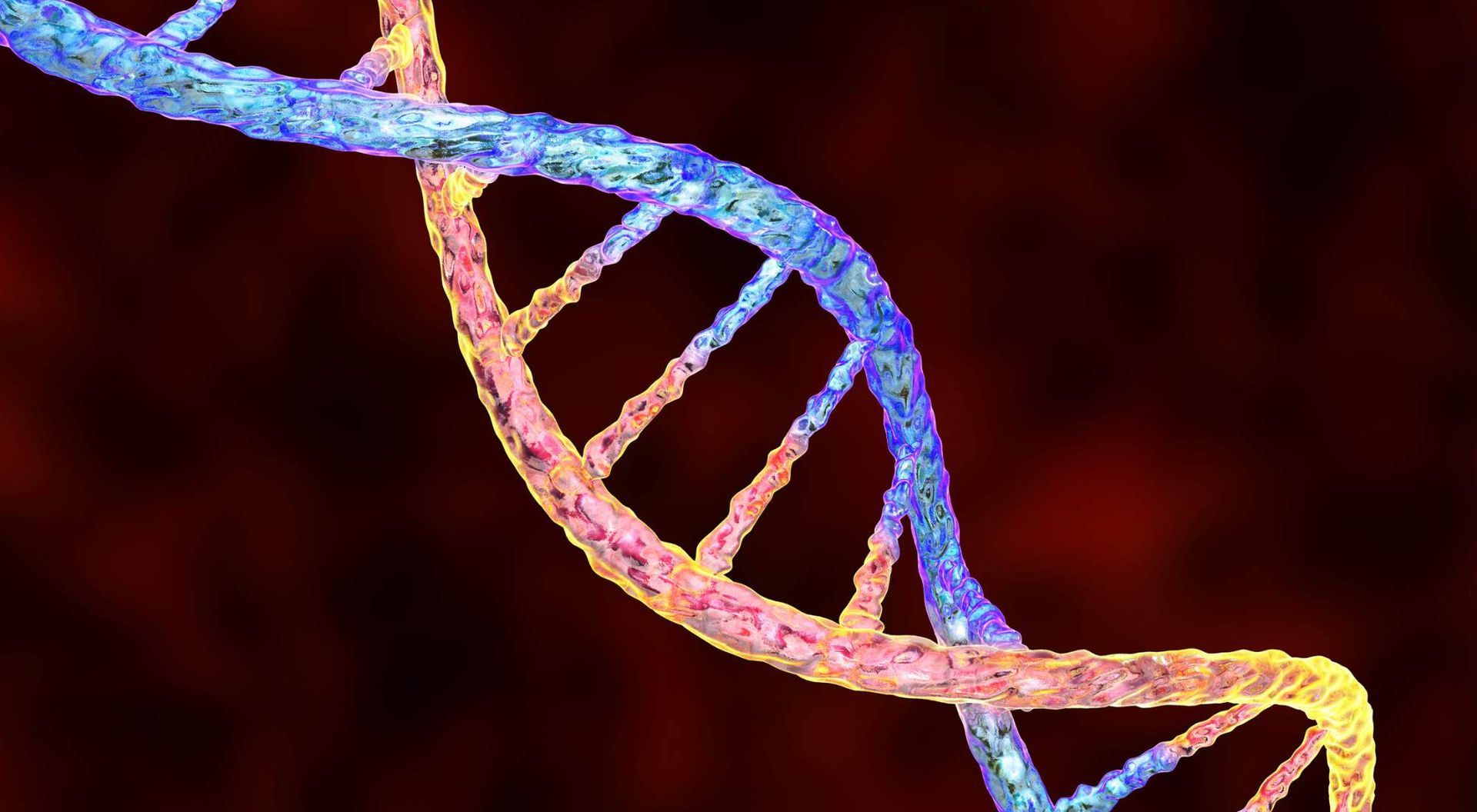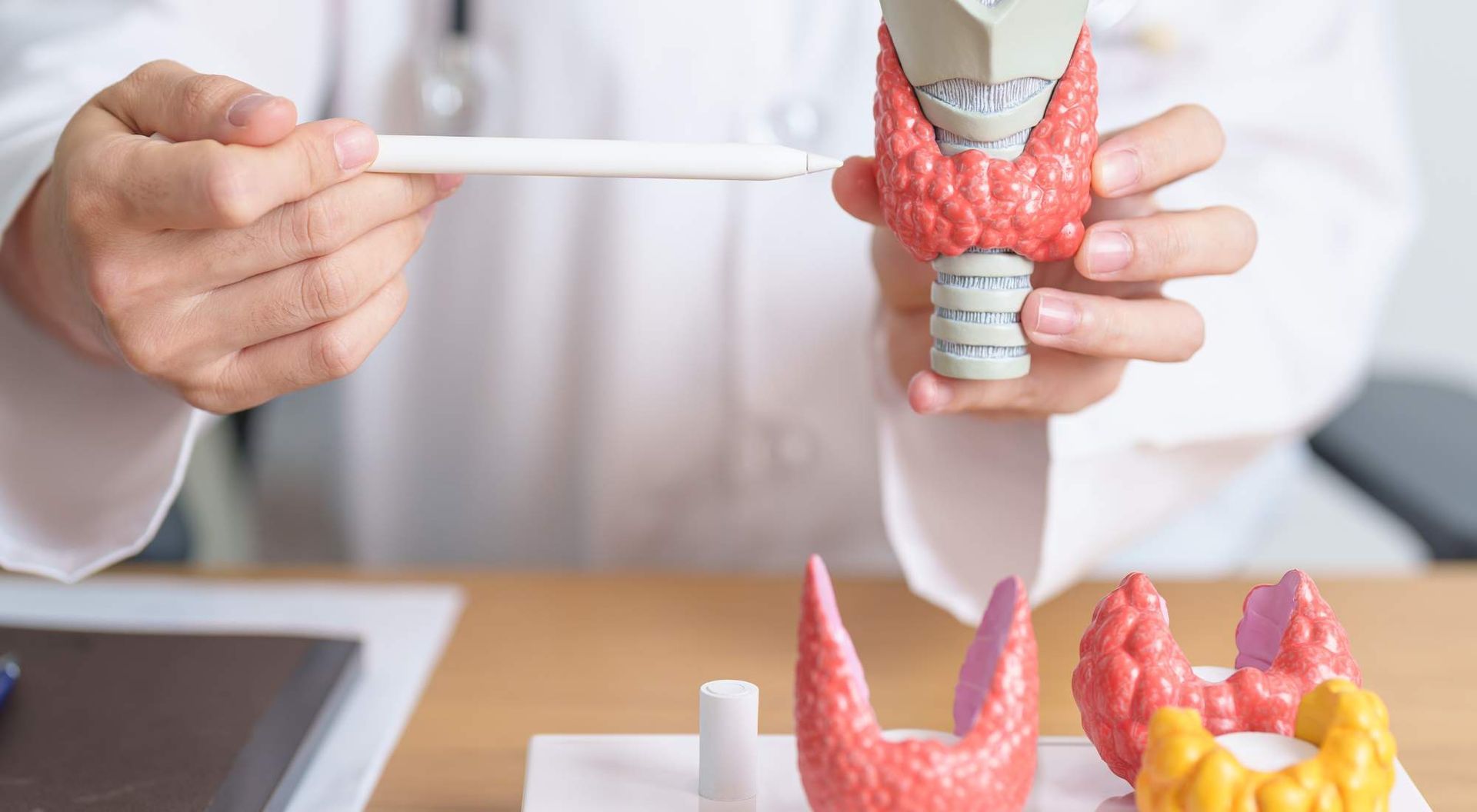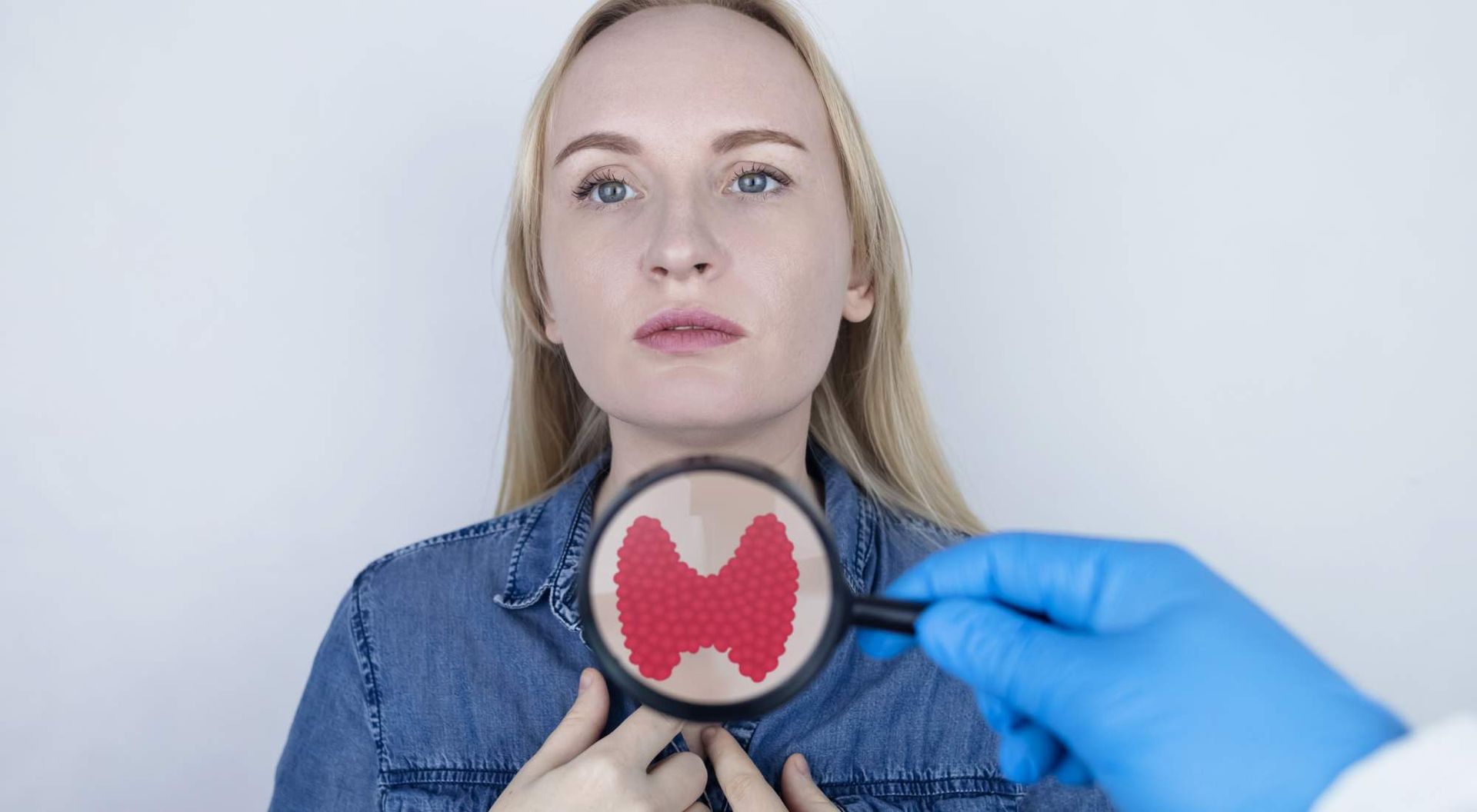Thyroid Issues and Heredity: Understanding the Role Genetics Play in Thyroid Disease
"The content below is not intended to be a substitute for professional medical advice, diagnosis, or treatment. Always seek the advice of your physician or other qualified health provider with any questions you may have regarding a medical condition."
Your thyroid may be small — but it’s mighty — and a key player in helping regulate your hormones and making you feel like “you.”
But even though you may go out of your way to maintain a healthy lifestyle to avoid thyroid issues, the truth is your thyroid health may be, at least somewhat, out of your control.
In this article, we discuss whether thyroid issues are hereditary, and how HealthierU can help you treat the symptoms of thyroid disorders through a holistic lifestyle and nutrition.
Table of Contents
Do Thyroid Problems Run in the Family?
Yes. But while thyroid problems can run in the family, there are other factors that can affect whether someone has thyroid disease or not.
Thyroid disease isn’t 100% dependent on genetics, and knowing your family history can help you stay one step ahead of hypothyroidism and hyperthyroidism and their related outcomes.
Developing Autoimmune Thyroid Disease: A Three-Pronged Perspective
Developing thyroid disease can be a combination of several factors, including:
- Genetics
- Environmental triggers; and
- Leaky gut syndrome
#1: Genetics
Some genes are commonly associated with the autoimmune aspect of Hashimoto’s disease. You may be predisposed or more susceptible to developing this thyroid condition if you have certain immune regulatory genes, two of which include:
- HLA-DR5 which can result in an enlarged thyroid gland
- HLA-DR3 which can result in atrophy of the thyroid gland
Since the development of Hashimoto’s carries such a strong genetic factor, this autoimmune disease is often considered to be hereditary. But research has shown that’s not the case.
A study of identical twins revealed that one twin would sometimes have Hashimoto’s, while the other would not.
If Hashimoto’s were a 100% genetic disease, we would see a correlation rate of 100% in the twins — since identical twins share the exact same genes, if one twin had Hashimoto’s, with 100% certainty, the other twin would as well.
The match rate in identical twins for Hashimoto’s disease is 55%.
Interestingly, the match rate for Graves’ disease is 30-35% with thyroid antibodies having an 80% correlation.
#2: Environmental Triggers
Environmental factors may also contribute to thyroid issues.
Those living under the same roof often share similar lifestyles and dietary habits and may be exposed to many of the same influences. So, if a factor is detrimental to maintaining a healthy thyroid, both individuals are then at risk for the autoimmune cascade.
Environmental triggers may include:
- Diet
- Infections illness
- Stress
- Cigarette smoke
- Toxic mold
- Alcohol consumption
- Similar body mass index (BMI)
- Medications
- Toxin exposure
#3: Leaky Gut
The final factor in the development of thyroid disease is a condition known as “leaky gut syndrome” or intestinal permeability. This condition occurs when tiny “holes” develop in the intestinal barrier and are often the result of damage caused by:
- Food sensitivities
- Gluten
- Nutrient depletion
- Adrenal fatigue
- Alcohol
- Stress
- Overly spicy foods
- Dental infections
- Small intestinal bacterial overgrowth (SIBO)
- Sinus infections
- Dysbiosis
- Enzyme deficiencies
- Gut infections
- Medications like non-steroidal anti-inflammatory drugs (NSAIDs)
- Psychological stress
- Strenuous exercise
- Surgery or trauma
- Toxins
These microscopic holes in the intestinal lining enable food particles and toxins to “leak” into the bloodstream. The body then labels these molecules as foreign invaders and launches an attack that eventually can result in autoimmunity.
Are you looking for hypothyroidism treatment in Brooklyn?
Led by Dr. Donna Sergi, HealthierU is Brooklyn's leading practice for holistic nutrition and chiropractic. Dr. Sergi has dedicated her life to the pursuit of health and wellness and is committed to helping her patients get well — and stay that way — naturally, through nutrition and lifestyle guidance.
Contact HealthierU today for your free consultation.
Are Thyroid Issues Hereditary? How Genes Play a Role in Developing Thyroid Issues
- Specific genes could be at play. The exact details of how thyroid issues are inherited aren't yet fully understood, but the process of genetic sequencing allows scientists to explore the roles genes play in thyroid health.
Genetic variants, or gene mutations, describe differences in a gene's deoxyribonucleic acid (DNA) sequencing that may affect your health. Hereditary gene mutations are passed to children from their parents, and research has shown that some hereditary genetic variants influence thyroid hormone production and your likelihood of developing a thyroid disease.
The most common form of hypothyroidism is the autoimmune condition Hashimoto's disease. Several hereditary genes have been associated with Hashimoto's, including thyroid-specific genes TG and TSHR and immune regulatory genes PTPN22, HLA, and CTLA4. Parents and siblings (first-degree relatives) of someone with Hashimoto’s disease are 9x more likely to develop the disease themselves.
- Thyroxine and TSH levels can be determined by genes, and if those levels are too high or too low, it may cause thyroid dysfunction.
As researchers have studied the relationship between thyroid disease and genetics, their
findings
suggest that genes can play a major role in thyroid disease and may determine the levels of thyroxine and TSH, the two hormones that contribute to most thyroid conditions:
-
- Thyroxine is produced by the thyroid and helps regulate the metabolism and various other bodily processes. Too much thyroxine, however, can lead to hyperthyroidism.
- TSH is also known as thyroid-stimulating hormone and helps regulate the production of thyroxine and triiodothyronine. High concentrations of TSH can result in hypothyroidism, and low concentrations can lead to hyperthyroidism.
-
How To Know if Genetics Are Playing a Role in Your Thyroid Disorder
While genetics are likely not 100% to blame for thyroid disorders, the only way to determine if genes are to blame (or how much they may be to blame) for thyroid problems is through testing.
Genetic testing for thyroid disorders involves searching for genes associated with the disease and analyzing the molecules and gene sequences. To perform this testing, you’ll undergo a technique known as thyroid fine needle aspiration biopsy (FNAB).
During this procedure, the doctor inserts an ultra-fine needle into a thyroid nodule to extract a sample of cells. The thyroid cells are then analyzed for genes associated with thyroid dysfunction by utilizing one of the following gene sequencing techniques:
- Afirma gene expression classifier – Looks at messenger RNA
- Fluorescence in situ hybridization – Uses fluorescent microscopy to analyze potential genes
- Sanger dideoxy sequencing – Creates DNA fragments by copying sequences that may be linked to thyroid disorders (this is the most widely used technique)
Other Causes and Risk Factors of Poor Thyroid Function
Causes of poor thyroid function include factors such as:
- Autoimmune diseases like Hashimoto’s
- Surgical removal of all or part of the thyroid gland
- Radiation treatment to the neck or head
- Thyroiditis (the inflammation of the thyroid gland from infection or autoimmune disease)
- Medications like some chemotherapy drugs or lithium
- Family history (genetics)
- Hypothalamic or pituitary gland disorders
- A congenital thyroid condition where a child is born with a partially developed or absent thyroid gland
Risk factors for poor thyroid function include:
- Gender – Women are 5-8x more likely to develop hypothyroidism than men, especially older women.
- Family history – Having a family member with thyroid disease increases the risk.
- Autoimmune disorders – Those with autoimmune disorders like type celiac disease, 1 diabetes, rheumatoid arthritis, lupus, or Addison's disease are at an increased risk.
- Pregnancy – Pregnant women or those who have given birth in the last six months are at greater risk.
- Radiation – Radiation to the head, neck, or upper chest can increase the risk of thyroid issues.
- Thyroid surgery – Thyroid surgeries such as thyroid lobectomy can increase the risk of hypothyroidism.
- Other health conditions – Health issues such as Turner syndrome, Sjögren's syndrome, or pernicious anemia can increase the risk of thyroid disease.
- Iodine deficiency – Not getting enough iodine through food can contribute to hypothyroidism.
- Surgical removal – Individuals with all or part of the thyroid gland be at risk for thyroid issues.
Can Genetic Thyroid Disease Be Prevented?
No. Thyroid disease caused by genetics can’t really be prevented, but there may be some things you can do to limit the risk, including:
- Maintaining a healthy diet
- Managing stress
- Staying active
- Getting plenty of sleep
- Avoiding environmental toxins
5 Ways To Minimize the Risk of Developing a Thyroid Disorder
#1: Eat a Healthy Diet
A balanced diet is a huge factor in maintaining thyroid health. Foods that can help sustain healthy thyroid levels include:
- Yogurt
- Nuts
- Legumes and beans
- Apple, pears, berries, and citrus
- Green tea
- Broccoli
- Quinoa and oats
- Eggs
- Seafood
#2: Manage Stress
Chronic stress has been shown to increase your risk of developing thyroid disorders.
Reducing stress levels helps maintain balanced hormones, which is essential to supporting thyroid health and minimizing the risks of developing hereditary thyroid issues.
#3: Stay Active
Regularly exercising and moving your body is another way you may be able to minimize your risk of hereditary thyroid disorders.
Regular exercise:
- Helps maintain hormone levels regulated
- Boosts metabolism
- Promotes overall well-being
#4: Get Enough Sleep
While a lack of quality sleep may not directly cause hereditary thyroid illnesses, it can:
- Disrupt hormone imbalance
- Increase the risk of illness
- Contribute to overall health issues
#5: Avoid Environmental Toxins
To help ensure a healthy thyroid, you want to avoid certain environmental hazards as much as possible. These include things such as:
- Pesticides
- Pollutants
- Radiation exposure
- Formaldehyde
- Endocrine disruptors
Ensuring indoor air quality and using eco-friendly cleaning products are other highly effective ways to minimize your risks for hereditary thyroid issues.
No Matter What Contributes to Your Thyroid Issues, HealthierU Can Help With a Holistic Nutritional Approach
Are you wondering if you have a thyroid issue — or if your genetics may put you at risk?
HealthierU helps patients deal with thyroid risks and problems through a holistic nutrition approach that leaves them feeling empowered and encouraged.
A free consultation with holistic nutritionist, Dr. Donna Sergi, is the first step towards feeling like yourself again.
Dr. Sergi can help you determine the precise cause of the symptoms you are experiencing and provide expert guidance about the best lifestyle and nutrition choices for your unique health circumstances.
Schedule your free consultation today at HealthierU.






